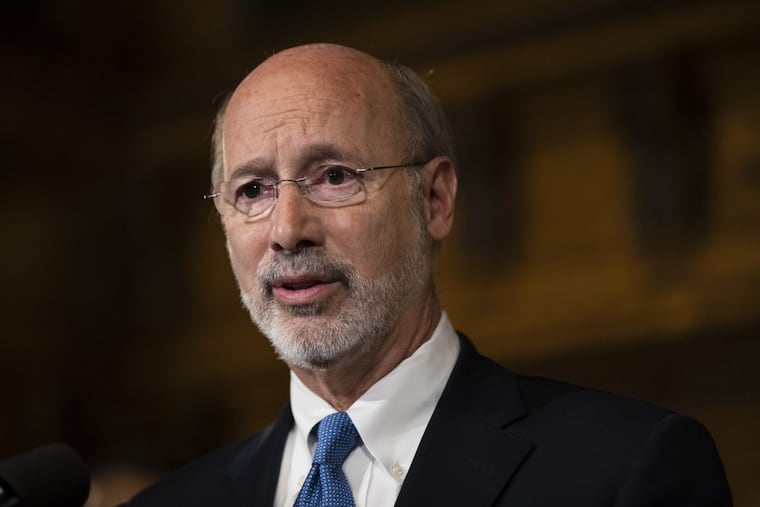Clean Slate Act, pioneered in Pa., is a win for society. | Opinion
Gov. Tom Wolf and Rep. Lisa Blunt Rochester: One-third of American adults have some kind of criminal record, so chances are, you know someone who is facing a lifetime of consequences for a single mistake.

Think back to the biggest mistake you’ve ever made. Now imagine that you had to recount that incident to every job interviewer, every landlord, and every college admissions officer for the rest of your life. Where would you be today if you were judged by your worst moment?
That’s the reality for Ronald Lewis, a 39-year-old father from Philadelphia, who was convicted of two nonviolent misdemeanors in 2004 and for millions of other Americans. Nearly 15 years later, Ronald is a different person than he was back then. He went back to school and earned top marks – graduating as a certified HVAC technician.
With his qualifications, he was an ideal job candidate. But as soon as the background-check results came back, Ronald was out of the running, and the rejection letters kept coming. “That broke my heart,” he said, “because you thought your life was starting to amount to something.” Despite his hard work, Ronald’s second shot at the American Dream was out of reach.
Today, Ronald’s experience is all too common. Nationwide, there are roughly 100 million Americans with some kind of criminal record. Just like Ronald, they want a stable job, a roof over their head, and the chance to provide for their families. But the vast majority of employers, landlords, and universities now run background checks on applicants.
Even a minor record can be the difference between opportunity and rejection. Unemployment among formerly incarcerated people is five times higher than it is for the general public. In effect, it’s harder to get a job after leaving prison than it was to find work at the peak of the Great Depression. But it’s not for lack of trying. Formerly incarcerated people are actively searching for jobs at a higher rate than their peers, yet their past continues to stand in the way of their future.
In Pennsylvania, historic steps have already been taken to ensure that a criminal record doesn’t come with a life sentence to poverty. In June of last year, the nation’s first Clean Slate bill was signed into law. This groundbreaking policy automatically seals nonviolent criminal records for people who remain crime-free for 10 years. Now, thousands of Pennsylvanians can get the second chance that they’ve earned, and they won’t even have to go to court and petition for records to be sealed.
It’s no secret that Democrats and Republicans don’t agree on much lately. But in Pennsylvania, the Clean Slate Act passed the state legislature with overwhelming support on both sides of the aisle. Clean Slate’s popularity is easy to understand: It’s just good policy. Clean Slate is an opportunity to help everyday Americans build a better life, while also driving down unemployment rates and improving our economy. And by automating the record-sealing process, the policy takes the burden off the court system and frees up judges for more important matters. It’s no wonder then that 70 percent of American voters support Clean Slate policies.
Almost a century ago, the Supreme Court famously referred to the 50 states as “laboratories of American democracy.” Pennsylvania’s passage of Clean Slate legislation shows that states are still leading the way with innovative policy solutions, and it’s time for Congress to follow suit. That’s why we are proud to back the reintroduction of the federal Clean Slate Act, which will be filed during April, also known as “Second Chance Month.”
Modeled after Pennsylvania’s successful bill, the Clean Slate Act will automatically seal federal arrest records that didn’t result in a conviction, making sure that people who were found innocent aren’t punished for a crime they didn’t commit. Importantly, the bill would also seal records for nonviolent marijuana charges – a critical step in righting the wrongs of racially biased drug-enforcement policies.
Today, more than three-quarters of people serving time for federal drug charges are black or Latino. The barriers to opportunity are compounded for people of color with criminal records, especially women. Even after paying their debt to society, 40 percent of formerly incarcerated women of color can’t find a job. By reducing barriers to employment, like the ones Ronald faced, we can take meaningful strides toward getting more and more Americans back to work – a win for the economy, a win for our justice system, and a win for our society.
One-third of American adults have some kind of criminal record, so chances are you know someone who is facing a lifetime of consequences for a single mistake. They have held up their end of the bargain by serving their time and staying out of trouble. Now, it’s time we give them the clean slate that they deserve. It’s time for Americans nationwide to have the same shot at a brighter future.
Contact your member of Congress or state elected officials today and ask them to become supporters of the Clean Slate Act and policies that will give more Americans the opportunity to live productive and meaningful lives.
Tom Wolf is governor of Pennsylvania. Lisa Blunt Rochester is the U.S. representative for Delaware’s at-large congressional district.